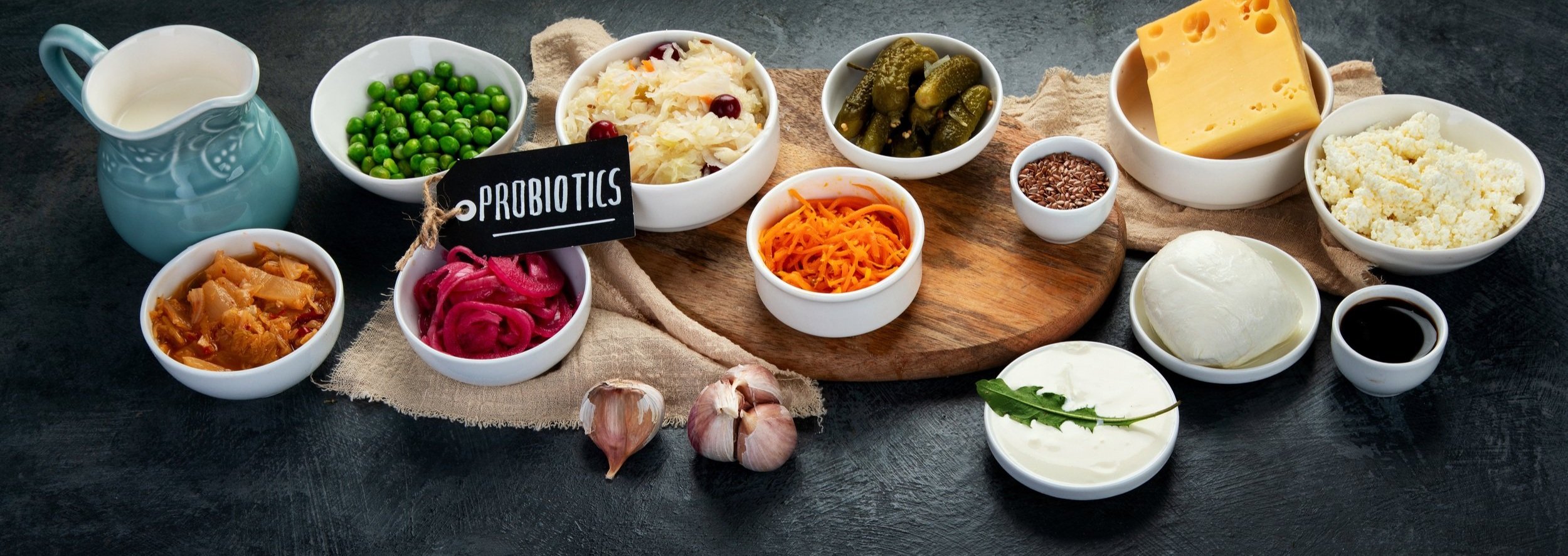How to Find the Best Gluten Free Probiotic
One of the most beneficial types of food and drink out there is the probiotic, but few people know exactly why probiotics are so great or where they come from. It’s good to know some of these details as probiotics could be a great supplement for practically anyone’s diet. In this article, we’re going to cover what probiotics are and why probiotics are beneficial for certain afflictions, including those with celiac disease.
There are a wide range of certified gluten free probiotics on the market, but still it’s important to know which ones won’t present any risk to those with a gluten sensitivity or celiac disease. Unfortunately, it’s never crystal clear. We’ll go over some of the best probiotics for gluten and dairy intolerance as well as the best probiotics for those with celiac disease. First, let’s cover some of the basics of what probiotics are.
What Are Probiotics?
Let’s break it down. The word probiotic can be dissected into its Latin and Greek roots. The prefix “pro-” is from Latin, essentially meaning “in advance of” or “taking care of.” The root word “bio” comes from the Greek word bios meaning “life.” The suffix “-tic” is also from Greek and means “pertaining to.” When formed into a full definition, the word probiotic means “pertaining to the taking care of life.”
When applied to foods, probiotics can be both part of the normal composition of the food or they can be intentionally added for health purposes. To be considered a probiotic food, species of lactic acid bacteria need to be able to use it as a food source and grow. Lactic acid bacteria are present in the mouth and intestines. What you eat will either benefit or harm these bacteria.
Various common food products such as yogurt, pickled vegetables, sourdough bread, and soy sauce are a few examples of foods that contain and support lactic acid bacteria that are so beneficial for our health.
Many food and drink products are fortified with additional lactic acid bacteria in order to improve digestive health in the stomach and intestines. Many brands of kefir and kombucha, both probiotic drinks, have been fortified to make them especially beneficial to the digestive system. This healthy trend is clearly catching on, because many food manufacturers have been adding probiotics to foods such as chocolate, condiments, spreads, and more.
Which Is Better: Gluten Free Probiotic Yogurt or Pills?
Yogurt is naturally high in probiotics. In fact, it has been one of the main sources of probiotics for thousands of years in many parts of the Middle East, Europe, Asia, and beyond. Well before anybody knew what bacteria or probiotics were, many people knew that yogurt was a food that is beneficial for digestive health. In diverse food cultures such as those in Turkey and India, it is consumed practically every day in some form.
You may be wondering: why did people start taking probiotic pills in the first place? While some people actually don’t like eating yogurt very much, there’s actually much more to it than that. Yogurt contains a multitude of wonderful probiotic bacteria strains, but it has an unpredictable and inconsistent CFU number. The CFU number refers to the “colony forming unit”; or the number of live bacteria cells present in each serving. This is the number of bacteria which are projected to best create a colony of beneficial bacteria within the product. In general, this number can tell you about the potency of a probiotic food or drink product. A normal CFU count for a healthy digestive system is ingesting 100 million to 1 billion CFUs per day. The higher the CFUs, the more potent the probiotic will be. Bacteria are usually counted in the billions, ranging from 2 billion to 75 billion. Many of the probiotic supplements produced these days actually have far higher CFU counts than yogurt, and a multitude of beneficial strains that have been grown on purpose.
Keep in mind that these supplements shouldn’t be thought of as “pills,” even though they’re consumed the same way. Probiotic supplements have preserved and concentrated amounts of lactic acid bacteria strains that come alive when they come in contact with the mucus in your intestinal tract. The supplements contain no active drugs and are merely some much more consistent versions of probiotic foods and drinks.
Is Kefir Gluten Free?
One of the favorite probiotic drinks of many European and Central Asian countries is quickly gaining popularity amongst those with a gluten sensitivity. Kefir is a drink that comes from the fermentation of milk using kefir grains made of probiotics. Many people have grown to love the drink for the way it makes you feel refreshed.
You’ll be happy to know that the drink, just like its cousin yogurt, is completely gluten free. There are no ingredients except for milk and the added probiotics that give it the health benefits. As always, it’s important to look for a certified gluten free label to ensure that the product hasn’t been contaminated in a plant that processes wheat products.
Are Probiotics Gluten-Free?
Generally, yes, probiotics are gluten free. However, some probiotic products have been tested to contain notable traces of gluten. To be classified gluten free under the guidelines of the US Food and Drug Administration (FDA), a product needs to be tested to contain less than 20 parts per million (ppm). Most brands of probiotics have been tested to contain zero or less than 20 ppm, but some have been above that threshold.
The only determiner of whether a food product is probiotic or not is if it has lactic acid bacteria, whether naturally occurring or added during production. These living bacteria have nothing to do with gluten, which is a non-living protein that comes from the various varieties wheat, barley and rye. Finding out whether a probiotic product is gluten free or not depends on other factors.
Some types of food and products, including those that are probiotic, naturally have gluten or have gluten added as a thickener. Of course, the most common glutenous foods are breads and other foods made with wheat, barley, or rye flour. Some foods and drinks, such as soy sauce, have glutenous additives. The main determiner of whether the probiotic food or drink has gluten or not is if the product has naturally occurring gluten or if gluten is added during production.
The other factor to determine whether a food or drink product is gluten free or not is whether it was harvested, processed, packaged, or distributed with other glutenous products. A lack of controls in place during any step during the production could lead to enough gluten contamination that the product cannot be certified gluten free by the FDA. That’s why you may see a gluten free label on many products that have nothing to do with gluten to begin with. Food and drink companies that are certified gluten free take calculated measures to ensure that their products are gluten free (or uncontaminated by gluten-containing products during processing) from start to finish. The same goes for probiotics.
Can Celiacs Take Probiotics?
The term celiac refers to those with celiac disease, an auto-immune condition. One of the many causes of celiac symptoms is the ingestion of gluten, which causes a severe inflammation in the intestinal tract. Many celiacs are so sensitive to gluten that they can become gravely sick. The FDA defines gluten free food and drink products to have less than 20 ppm of gluten. While there are many gluten free certified products out there, many of them still contain between 1 to 20 ppm. Even with such a small number, these products can still cause symptoms of illness in those with celiac disease.
Those afflicted with celiac disease should exercise extreme caution even with gluten free products. The gluten free research website beyondceliac.org recommends that celiacs take probiotics, however. Studies have shown that the ingestion of probiotics can improve some of the symptoms of celiac disease. Of course, it’s very important to only ingest probiotic products that have been certified gluten free.
Which Probiotic Is Best For Gluten Sensitivity?
To find the best probiotic product for gluten sensitivity, it’s important to first ensure that the product is gluten free certified. If it is not clearly labeled as such, you shouldn’t use that product.
The next step is to look for the number of colony-forming units (CFUs). However, the CFU number has little to do with improved health benefits. Some celiacs have found that probiotics with a lower CFU number have worked best for them while others prefer products with a higher CFU number. Buying a probiotic long-term should depend on how that specific product makes you feel.
Another important factor to look for is whether a probiotic is shelf-stable or not. Many probiotic products, especially those that have dairy, need to be refrigerated for their entire shelf life. If they are left in temperatures of above 41 degrees Fahrenheit for more than four hours, they may become unsafe to eat or drink.
Country Life Dairy-Free Power-Dophilus is a great probiotic product for those with all sorts of dietary restrictions. In addition to being a healthy probiotic supplement, it is certified completely gluten-free. It is also completely dairy-free, soy-free, and entirely vegan. This product has a CFU count of 12 billion, which puts it well above the daily suggested amount of 1 billion. Best of all, it requires absolutely no refrigeration and will stay up to 24 months in a cool and dry place.
Are Probiotics Good For Gluten Sensitivity?
One of the main characteristic symptoms of celiac disease is the inflammation of the digestive tract. This is caused by the presence of a protein to which the body has an autoimmune response. In essence, the immune system will start to overcompensate and attack the healthy tissues as well. Several studies have found that the presence of various strains of lactic acid bacteria will change the autoimmune response which triggers inflammation.
One study published in 2015 in the journal Digestive Diseases and Sciences used two strains of lactic acid bacteria named Bifidobacterium breve: BR03 and B632. When the subjects had an autoimmune response that resulted in inflammation, the ingestion of these bacteria strains through a supplement caused a direct reduction in inflammation. Afterwards, the subjects were not given the probiotic supplement and the inflammation symptom returned. This study has since been repeated successfully.
What Are The Best Gluten Free Probiotic Gummies?
Some of those with celiac disease have found the supplements to sometimes be a little less than pleasant to swallow. In order to make the experience more pleasurable and attractive to those needing dietary supplements, some companies have developed delicious gummies that provide the probiotics needed for digestive health.
One such probiotic gummy is the line of Align Duobiotics. These gummies come in various fruit flavors that are quite easy to swallow and they taste great. The name Duobiotics refers to the two components of the supplement: the prebiotic fiber known as inulin, and the strain of probiotic bacteria Bacillus coagulans. The inulin fiber helps to facilitate a good growing environment for probiotic bacteria. There are other similar products from Align that also act as a sleep aid and a de-stressing agent in addition to the probiotic benefits. Duobiotics gummies do contain dairy products and are processed in the same facility as other products with soy. These gummies do not need refrigeration and can be stored up to 24 months in a cool and dry place.
What Are The Best Probiotics For Celiac Disease?
Everyone with celiac disease knows very well the risk of consuming they aren’t completely sure about. If one of these food or drink products has more than 20 ppm, it can cause severe inflammation. If the product is between 1 and 20 ppm, it may still cause a reaction. To be entirely sure that a product is safe for celiacs, it needs to be certified gluten free.
A fantastic product that has been tried and trusted by celiacs is NOW Supplements Probiotic-10 capsules. This great supplement is tested and proven to be entirely gluten-free as well as being vegan, dairy-free and soy-free. The Probiotic-10 has a CFU count of 25 billion, showing quite a high potency.
Does Amazon Sell Gluten Free Probiotics?
A quick search on Amazon.com shows that the online selling giant has over 3,000 varieties of gluten free probiotics available. Due to this staggeringly high number, it may actually feel somewhat impossible to even begin a search. When you search for products with a rating of at least 4 stars, that number drops to around 2,000. Even if you narrow the search down to only products under $25, the list still includes more than 1,000 products. You can rest assured that whatever gluten free probiotic product you choose will be available on Amazon. If, for some reason, you can’t find a specific product, there will be plenty of great substitutes.
Is Culturelle Gluten Free?
Culturelle is one of the largest brands of probiotic supplements in the market. There are several products that are designed for different age groups and for men, women, or children. Culturelle products do not have wheat, dairy, eggs, tree nuts, or peanuts added. Culturelle is listed as gluten-free on their website. However, Culturelle is part of ConAgra, which is a larger company that processes and packages products with all of the aforementioned allergens. It is therefore probable that Culturelle products have come into contact with glutenous products or other allergens at some point. Though those with a gluten sensitivity may not have a reaction to Culturelle products, it’s not recommended that celiacs take the risk due to potential contamination.
How Should I Start Buying Probiotics?
As someone with a gluten sensitivity or even celiac disease, it might be difficult to know where to start when you buy probiotic supplements and other products. If you already eat lots of probiotic foods such as yogurt or pickled vegetables, then you can consider buying some less potent probiotic supplements. If you have a particular aversion to foods like yogurt or pickles, then a higher potency of probiotic supplements may be the right call. Remember that probiotic supplements with a higher CFU count will have a higher potency.
Remember when you are considering probiotics that the CFU count will have little medical effect on the symptoms of celiac disease or other kinds of autoimmune response inflammations. The consideration is really only about your preferences according to foods. Another more important consideration for those with celiac disease pertains to the integrity of a company and their seriousness about gluten free products. If you consume a probiotic supplement that doesn’t have a certified gluten free label, you’re really rolling the dice and could potentially provoke a reaction.
When you start using probiotic supplements or eating more probiotic foods, it can be quite helpful to start taking notes about your condition before, during, and after using the supplements. Take note of how you feel in a general way, if there’s any sort of bloating or irritation occurring, etc. You may even start to feel better within a few days after the bacteria have started to colonize your gut. When you find a probiotic supplement that works for you, stick with it and continue to take notes of your symptoms day by day.


